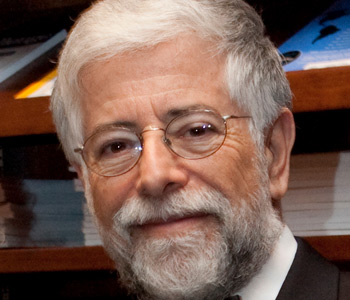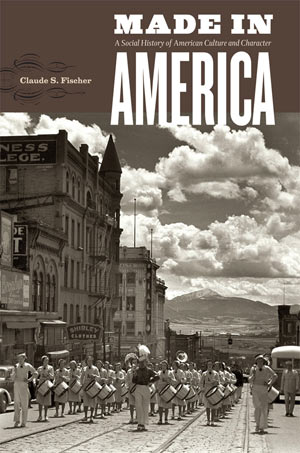
Made in America asks whether, how, and in what ways Americans of today are culturally and psychologically different from Americans of the past.
The book reaches back to the nation’s colonial era and comes forward to 2010. Throughout our history, observers, both Americans and foreign visitors, tried to describe the special character of this new people in a new world. But what was fact and what was myth in those descriptions? What is fact and what is myth in the ways we understand our history today? Much turns out to be myth—say the notion that Americans today are more mobile and less religious than their ancestors, or that they are more “consumerist.”
Made in America describes the material, social, and mental lives of average Americans from the earliest years through the industrial era to the present, focusing on the everyday experiences of everyday people, on how they survived, built families and communities, and came to understand themselves.
Synthesizing decades of historical, psychological, and social research, Made in America reveals how growing security and wealth reinforced the combination of independence with commitment to community in the voluntarism that characterized Americans from the earliest years.
Drawing on personal stories of many Americans from the past, the book describes how more people came to participate more freely and more fully in cultural and political life, thus broadening the category of “American.” At the same time, what it means to be American in culture and character has remained surprisingly consistent over the centuries.
I mean this book to speak to such classic interpretations of America as The Lonely Crowd and Habits of the Heart. Yet, Made in America challenges many of their conclusions.
“The availability and expansion of material security and comfort enabled the expansion and solidification of a distinctive American culture. That culture rests on the notion of community voluntarism: each individual is free to join or leave communities, such as congregations, but while a member of such groups, the individual is bound to be loyal.”
In many of the fiercest debates of our day—for example, about religion, government, family policy, health, even about personal relationships—people draw on vague notions of how things “used to be.”
But we can draw on more than vague notions. In recent decades historians have conducted intensive research on how average Americans in earlier times lived—on how they worked, raised their families, furnished their homes, dealt with illness, found friendship, coped psychologically, and so forth. This is the stuff of social history.
I find such detailed studies fascinating. They tell, for example, of efforts by itinerant ministers in the 1800s to set up the first churches in rural areas; of women confronting the loss of their babies; and of young up-and-coming men joining clubs as a route to middle-class success.
And I found that these studies, when collected together, speak to the debates of our day. For example, we like to think that neighbors helping neighbors was all that Americans once needed to deal with misfortune in their communities. Alas, that was more the exception than the rule in early America. Our expectations, our practical means, and even our emotional capacities for humane assistance to the needy grew over the last two centuries.
Made in America brings the studies of America’s past together into a series of story lines and one broad interpretation.
Among the specific story lines are these:
High rates of death and illness, of economic misfortune, and of interpersonal violence in earlier days gave way slowly to greater security—a security that enabled Americans to plan ahead and take command of their fates. This progress has been uneven and is threatened today, but over the long run, this has been the foundation of changes in American culture and character.
At the nation’s founding, relatively few Americans were truly the independent yeoman of American mythology. Most people were dependents of the household head and also subject to local elites. Over the centuries, more Americans participated in more social relationships of more kinds, including churches, clubs, work teams, and independent friendships. People—most notably, women—formed new bonds and gained more independence, thereby changing the nature of American community and character.
As Americans became materially and socially richer, more of them self-consciously worked on improving their characters and on cultivating the “proper” feelings. Although modern Americans are no smarter than their ancestors, they own a set of mental tools to operate in the world, tools that give them greater command of their lives and themselves. Americans learned to restrain their disruptive emotions and cultivate their socially useful ones like sympathy and sentimentality.
What runs through these seemingly disparate themes is one argument—that the availability and expansion of material security and comfort enabled the expansion and solidification of a distinctive American culture. That culture rests on the notion of community voluntarism: each individual is free to join or leave communities, such as congregations, but while a member of such groups, the individual is bound to be loyal. (“Love it or leave it.”)
Over time, more people—women, youth, ex-servants and -slaves, the rural, the poor, the immigrant—could participate more fully in that culture and in such ways become “more American.”
I would like to highlight just two passages.
The first is from the start of Chapter 2:
In early 1865, Abraham Lincoln was the most powerful man in the Western Hemisphere. He was also a man whose grandfather had been killed by Indians. He saw his infant brother die, he lost his mother when he was ten and his older sister when he was nineteen, and he grieved when Ann Rutledge—perhaps his sweetheart, perhaps just a friend—died of typhoid. He buried two of his four sons before they had reached the age of twelve and a third when he reached eighteen. He had a wife who was emotionally unstable, suffered depression himself, and would die prematurely and violently. This Job-like litany was perhaps severe even in the nineteenth century, but its like was familiar to Lincoln’s contemporaries. For example, most parents of that era buried at least one child, an experience that mercifully few American parents faced a century later. Life was precarious.
Over the centuries, American life became much less precarious. The threat of arbitrary and unpredictable calamities from illness or injury or economic misfortune abated. Being able to count on food, shelter, and safety from one day to the next helped more Americans gain confidence in their own power and a sense of self-reliance. More Americans made plans, charted their careers, scheduled their childbearing, designed their children’s education, arranged their retirements. Greater physical and economic security probably lowered Americans’ feelings of anxiety. In myth, the past appears to be seemingly unproblematic, but the prospect of, for example, a crop-destroying blight probably once frightened Americans more than the specter of a job layoff does today.
The historical expansion of security was unevenly distributed. In some eras, for example, when medicine began to seriously improve, richer Americans gained much more than poorer ones did. In other eras, for example, when public health measures took effect, the poorer gained the most, because their conditions had been so bad. Such qualifications in mind, we can still say that modern Americans lived with far more security and predictability than their ancestors did, even than their presidents did. Whether Americans’ feelings of security kept pace is a more complex question.
And this one is from the start of Chapter 6:
Sometime in the 1850s, Abraham Lincoln gave his wife a copy of a popular advice book he had closely studied, Mary G. Chandler’s The Elements of Character. Early in the book, Mary Todd Lincoln would have read, “Weak and helpless as we may be in the affairs of this life, there is, however, one thing over which we have entire control … one thing left which misfortune cannot touch, which God is ever seeking to aid us in building up, and over which He permits us to hold absolute control; and this is Character. For this, and for this alone, we are entirely responsible.” Building character, constructing a better self for which one is “entirely responsible,” has for centuries been an American project. Later generations used the term character less and psychological jargon more, but the construction project was much the same. In 2007, for example, entrepreneurs of “positive psychology” offered to teach people to “understand how our thoughts drive our feelings and our actions … [to] utilize a concrete set of skills to think more accurately . . . [and] apply these skills … to become more resilient, productive, and successful.” Mary G. Chandler would have approved.
Over the generations, more Americans participated in more such self-conscious self-improvement. Slowly shedding an old-world fatalism, they saw greater possibilities to control the world and themselves. With new knowledge, new technologies, and more options, planning and calculation could be increasingly effective. Critically, self-construction involved examining and molding one’s emotions. Middle-class Americans learned and taught their children to check feelings of aggression and to nurture feelings of sympathy and affection. Greater self-control, self-determination, and self-absorption and the “entire responsibility” for one’s character may have carried psychic costs in worry and regret. The Lincolns certainly were tortured souls.
“I mean this book to speak to such classic interpretations of America as The Lonely Crowd and Habits of the Heart. Yet, Made in America challenges many of their conclusions.”
Often our discussions about the issues of today rest on vague and even false understandings of yesterday. I hope that this book might enrich and perhaps complicate readers’ understandings of the American past. And I sure hope that journalists—and academics, please—would stop automatically using phrases like “in our ever more mobile modern society;” it just is not so!
We should appreciate, for example, the great physical and economic insecurity earlier generations faced, that the most early Americans were “unchurched”—anything but theologically as Christian as Americans are today, and that the lust for baubles and bangles is a long-standing American state of mind. We should also appreciate that the coming of material security—albeit still shaky at times—relied greatly on our collective efforts as Americans, through our governments, to build that security.
The world-views of literate, twenty-first-century Americans are rooted in a variety of conventional assumptions about our social history. These assumptions are part of what might be called the “modernity story”—that modern life (and post-modern life even more) entails the disintegration of a stable, cohesive, intimate “world we have lost”—replaced by a rootless, fragmented, and cold new social order. This is a powerful story line, and omnipresent in western culture. We often use it to make sense of the world around us. But it is mostly wrong.
I hope this book will offer you some insight into the nature of “modernity,” American style.


Claude S. Fischer is Professor of Sociology at the University of California, Berkeley. Besides Made in America, featured in his Rorotoko interview, and the theme of his blog, Fischer is also the author of America Calling: A Social History of the Telephone to 1940 (1992), Century of Difference: How America Changed in the Last One Hundred Years (with Michael Hout, 2006), and other books on urbanism, social networks, and economic inequality. Fischer is also the founding editor of Contexts, the American Sociological Association’s magazine for the general reader.